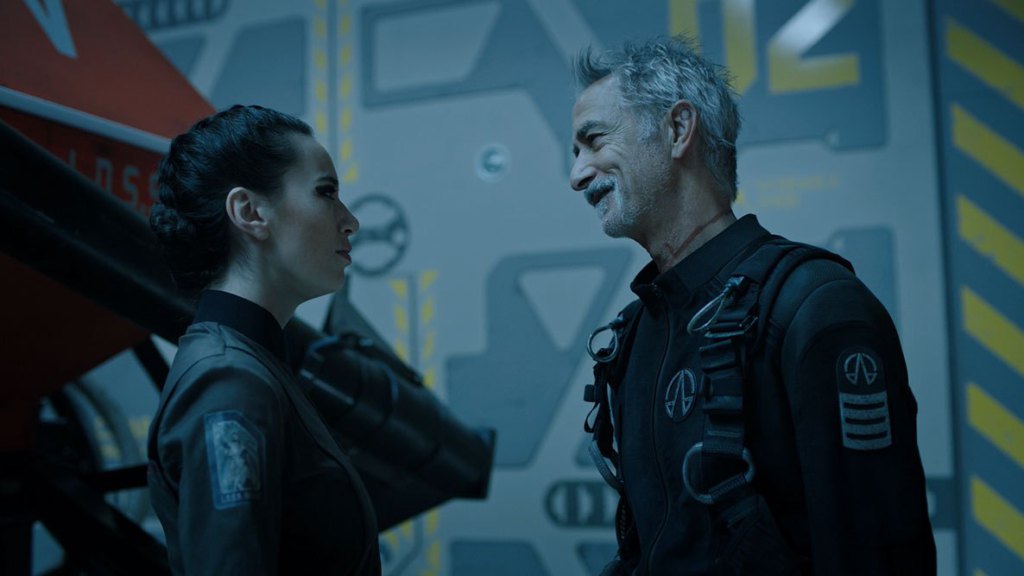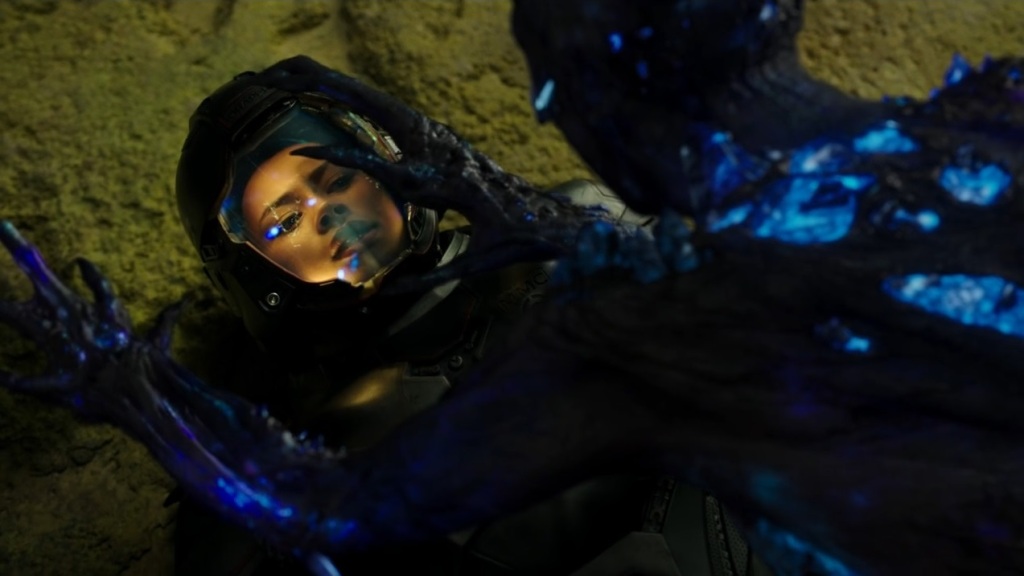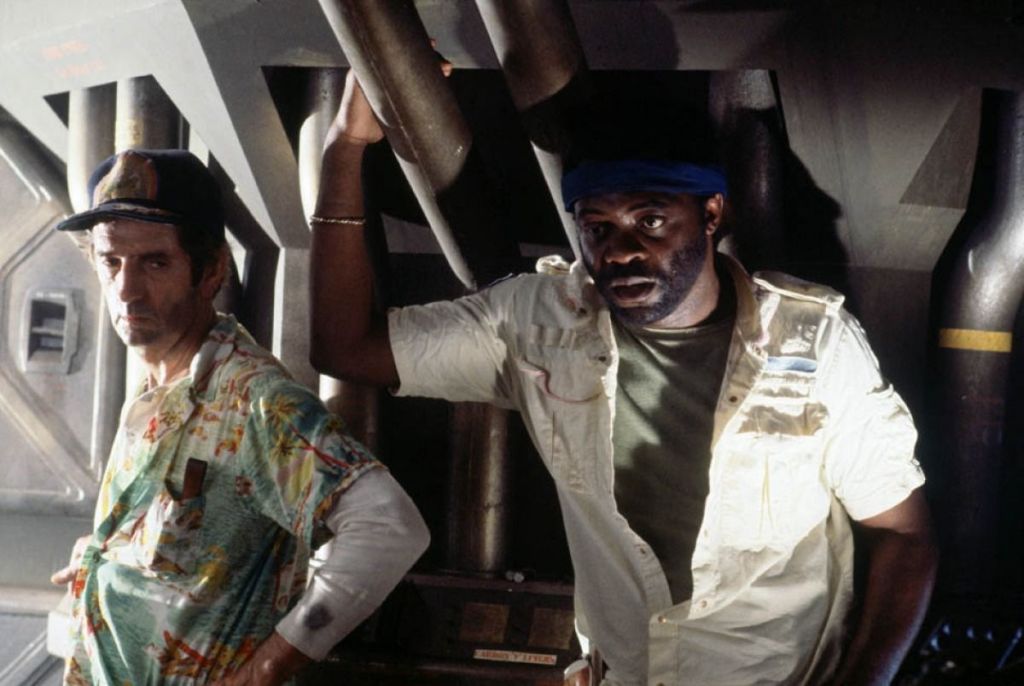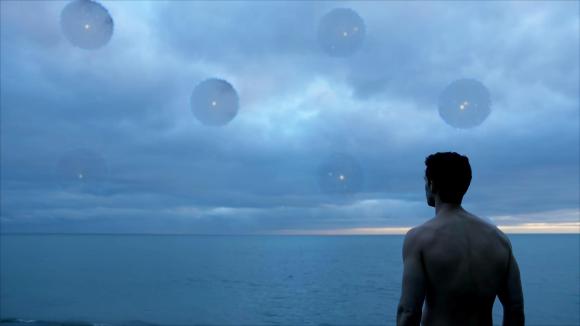Having recently re-watched the deep evolution of story in the Expanse over its six seasons it is hard not to feel that there was (and is) something special at work in this adaptation. Initially cancelled by Syfy channel after three gradually ramped up seasons – it was rescued by Amazon for three more before its final cancellation in 2022 with three books by the authors Daniel Abraham and Ty Franck still tantalisingly unadapted.
While generating a believable tableau of humans in an expanded and industrialised future solar system of tense, desperate politics – the early story’s marvellous pacing and unravelling mystery is as good as virtually anything that’s been on our screens for a long time. It is hard not to think without a somewhat underwhelming 4th season, that it might still be running now – though of course an expensive show like this needs to have a significant, committed audience and we can count ourselves fortunate to have had the extent that was made.
*
Backdrop
One of the things that captured attention early on is the show’s commitment to a realism of space-based human existence, a story world of unfurling practicalities in image of a colonised beyond. A tableau subject still to the essentially fearful and petty idiocies of humans, punctured by the perspicacity and quality of those fighting for something deeper and more cradled in understanding.
Although the books upon which the Expanse is based were being written contemporaneously (the story concluded in 2021 after 9 books), comments by the authors (pen name James S. A. Corey) suggest they are part of a lineage that could broadly be thought of as connecting to the earlier emergent SF of names such as Asimov and others who followed like Heinlein.
In this sense The Expanse as an effort to create this kind of fiction on screen reminds me of the 1960’s telecasting of Ray Bradbury’s Martian Chronicles. While in some way lacking intensity, these adaptations managed to convey in my childhood discovery of them, a kind of eerieness of the abandoned Martian civilisations. In one powerful left-over image from childhood, a human man, alone in a colony city on Mars – following a mass exodus, goes through the phone book of the abandoned city – calling each number in turn seeking out any possible company.

That particular story seems now a powerful relative of a recurrent human dreaming in stories, which has taken the form of an emptied / abandoned Earth and its evacuated cities (like the underrated 1980’s New Zealand film The Quiet Earth which I referred to while investigating this concept in more depth here). In this Bradbury story, the idea is transposed to the site of an evacuated sister planet of the Earth (Mars), in which are played out stories of connections across time and space with the ghostly renders of a somehow still extant civilisation of long-gone Martians.
*
The Expanse’s socio-political backdrop is that of a high stakes state-warfare story of three broad social-economic state formations, located respectively on Earth, Mars and those mining and living in the asteroid belts and outer planets; Belters. The latter a sub-class of economic scurf dwellers who live in stations, on asteroids as ‘rock hoppers‘ and ‘beltalowdas‘ mining minerals and materials for the ‘Inners‘. A committed and believable class structure, where the vivacity and rawness of the Belters is palpable, along with the feat of creating their own patois set in a mishmash multi-culture of physically distended (from the low gravity) economically repressed but ingenious and rebellious hard cases.
The Expanse has therefore the capacity to juxtapose its stories among the manipulations and treacheries of elite power mongers and corporate magnates, with the air and water-rationed, cramped-interiorised enervations of the belt (more of which below). It is here too that perhaps a debt is revealed also to Paul Verhoeven’s Total Recall from 1997 (adapted from Philip K. Dick).
It also bears saying that The Expanse creates some great characters along the way, a number of them female – while has there ever been a more ferociously rendered character than Cara Gee’s Drummer for example? A consistently elevating performance.

One set piece in the run up to the finale of the third season finds Drummer and her dangerously at-odds first officer Ashford, accidentally jammed and impaled on either end of a giant farm vehicle which will kill or maim Ashford if it moves backward and Drummer if it moves forward. It is an affecting scene, no more so than when Drummer sings a belter song ‘me was sick.’ It is also a brilliant pinioning of story, arriving as it does at the point where for one of them to progress, the other must become an injured party.
*
The transformative force
The Expanse, while rooting itself diligently as a story glued to a kind of factuality-of-existence in space, also seems to know that what is interesting in stories, about life and possibility, can come from outside of the bounds of an established conceptual framing of the world. Intercessions of deep mystery, which end up engaged with changing the nature of understanding and perception. The key agent of such a change in the Expanse being ‘the protomolecule’ an alien technological form of ancient origin which has unknown, advanced autonomy and intelligence and which works to reconfigure materials towards its own assembly (something that it refers to as ‘the work’).
At a certain point the group behind the development of a protomolecule human hybrid – which they create by mutating children with a rare genetic defect, decide to continue their experiments in order to learn what the protomolecule is doing elsewhere, when they discover it is in communication with itself across space-time. On the verge of stopping these experiments, the knowledge that they can potentially tap into and communicate with the protomolecule and its work sways them back onto the track of horror – undertaken in the name of human advancement.

*
You can tell you have a gem on your hands when the story suddenly goes past your set of (unrealised but present) expectations for what the world of this story is, what its formed of, how far it goes. As with a development in the third season wherein the protomolecule’s work leads to the formation of a giant ring gate in space which leads to an occluded unknown and anomalous space beyond.
At a certain point, when the tension is admirably poised, our protagonists (the crew of the gunship Rocinante) must win a battle of opinion to force the ships that have entered this zone to shut off their power. In effect it becomes a battle of approach. One vector believing that the only possibility of survival is to destroy the ring, the other being that all of the ships need to power down their reactors and show they are not a threat.
The battle therefore becomes about a responding to unknown power either reactively through violence or through abandon and it is abandon which triumphs and in itself leads to the (re-)opening (physically and materially in the show) of a realm of new realms. In this sense, the moment of trial or contest demonstrates forces that can include the possibility of abandon (‘yielding is the method of way‘ as the Dao de Ching says) a by-product of which becomes the arrival of new worlds. It is both canny and uncanny writing and gives a sense of where the show can find itself balanced in thought-provoking ways.
We’re on the brink right now because we keep reacting to things we don’t understand. We’re scared, we’re hurt, and we’re reaching for violence cuz we can’t figure out what to do. Just this once, can’t we try something else?
Holden (The Expanse S E13)
*


*
The precarious edge
In its fourth season, the Expanse further explores the philosophical dimension of the Belters as the marginalised scurf-class, but who are both literally deterritorialsed and simultaneously affirmed as beings of space. When a discussion is had between Drummer and the character of Nagata (both Belters) about the potential of Belters colonising new worlds, the refutation from Drummer is that ‘We are creatures of space‘ – and that those who might successfully begin such colonising ‘[they] will be Inners‘ within two generations. Their essential Belter/deterritorialised aliveness lost.
The reminder that a human culture in some way more alive, or alert (albeit suffering in many respects human injustice and the intense difficulties of environment) can be lost to the forgetfulness of human lifespans and adaptations. One gets the feeling this also works as an analogue for the widespread loss in our times of the human cognitive system of indigenous peoples – beliefs and perception (including abstract perception) – lost specifically to a capitalist state-social colonisation of its own which blocks and shuts down differential cognitive modes outside itself.
*
‘I have a family now, certainly not one I would have expected, but I love them and they love me‘.
Nagata to Belter coloniser (S4)
As well as re-structuring the concept of family to that of crew (a mobile / nomadic group) the story places the crew – unintentionally inveigled in state warfare – at the very edge of the unknown in epocal terms for human knowledge and encounter, and makes them key forces in the ultimate quality of response, but also crucially makes their bond one of love.
This crew social formation also ensures that the strict lines of class/nationhood of the Inners and the Belters is broken up and shown in it’s own way to be unnecessarily constrictive – a reappearance of state modality / territoriality. The conversation quoted above is between Nagata (played by Dominique Tipper) and a Belter who has given up on life from the guilt of an act she committed. ‘From where you are now to where I am, there is a path‘ Nagata counsels on dealing with guilt of her own. It is the conversation about reconnecting with life through love and although only indirectly present, it also includes in its proposition – Nagata and The Rocinante crew’s position in relation to acts and discoveries at the edge of the unknown – at the edge of human knowledge.
*
Antecedent structures and beyond

Writers Abraham and Franck have referred to Ridey Scott’s Alien (1979) as being a primary inspiration for the story, perhaps nowhere more evident than with that film’s depiction of the class-structure aboard the Nostromo ship. The flight and science officers (Signourney Weaver’s Ripley et al) are the wealthier priveleged cohort while the engineering crew (Harry Dean Stanton and Yaphet Kotto) the downtrodden mechanics, attempting in vain to re-negotiate their stakes at the first sign of trouble.
Playing out this social stratification is immensely fruitful for the story of The Expanse – while lending a reality to the plight of those without whom the material foundations and structures of society would fail, yet who remain perpetually and punitively marginalised. Towards the end of the series, the arrival of the ring gate and its promise of new worlds becomes the existential question over whether Belters can continue in their present form, or will they become assimilated to the cause and corresponding reality of terraforming and colonising new worlds.
The resonance is clear, as it is likewise on a matter of ecology – the Earth is mostly polluted and ruined by humans – yet the ‘land’ in a wider sense (including the terrains of the protomolecule, its transitive medium to novel worlds) are also holders of ancient secrets and ultimately remnants of life that re-write the known possibilities of materiality.
The premise used in the Expanse – as its protagonistic engine, is certainly not new, but there is a line there back to Nigel Kneale‘s Quatermass – the disovery of anomalous life forms and technology, which turn out to be ancient and primarily unfathomable but that lead to a transformation of human life. With the 3rd production Quatermass and the Pit broadcast in 1958, the outcome is found to be that humans are essentially alien and are what remain of an alien arrival on Earth, bred out over hundreds of thousands of years. The Expanse retains an apparent separation between humans and the alien remnant technology, but comprises a literal re-territorialisation of the mis-en-scene of human existence – with thousands of new star systems and worlds available through the ring gate that the technology forms. Frontiers of life are also re-written when we realise that those who destroyed the gate builders eons ago, appear to be liminal beings who occupy a space adjoining the reality of humans, seemingly compatible only at the threshold of crossing through the ring gates themselves.

It’s worth re-stating that these radical changes to the human sphere of possibility in the story are earned through an act that abandons violence and (literally) gives up power. In among the thrilling battles and action, as a centre-piece of story telling, this remains radical – the abandonment of reactivity at the threshold of new, transformative spaces.
That it gives us the ghost of these past aliens – their constructions returning as automata – is also significant, in the absence of the aliens themselves – it generates an opportunity in the story to magnify the world of humans as deeply reactive, introverted and self-obsessed. Aside from the Rocinante’s captain Holden (Steven Strait), regularly concerned at being out of his depth, the human tableau in the Expanse seems almost entirely unable to evolve or transform perception and understanding, to evoke the possibilities of wider realms of impact on the stories of our reality – the things we tell ourselves can only ever be real. Except for those good few stories of endeavour of course, who battle endlesslessy within and without and in the Expanse at least, arrive at a keener necessity for the wellness of our shared world of being. And then again perhaps, as Nagata says…
‘From where you are now to where I am… There is a path‘
***
